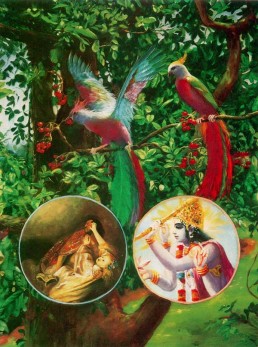Swami Chinmayananda
Swami Chinmayananda Commentary
OF THE ALPHABET I AM THE LETTER ‘A’ — It is very well-known that, without the help of vowels, words cannot be pronounced. Of all languages, Sanskrit is particularly sweet because of the preponderance of the ‘A’ sound in it. In fact, every letter in its combination is to be pronounced in Sanskrit with the sound of ‘A’ added to it to lengthen it to its full sweetness. This, as it were, lubricates the words, and consequently the language has no back-firing disturbances of rattling nuisance or disgusting hoarseness. Because of this smooth run of the ‘A’ sound in every letter, there is a melody even between words and a lingering echo between sentences. In fact, after a long chanting of a Sanskrit text in a hall, there is, for the sensitive, a perceptible atmosphere of soothening music in the air that can lull all the agitations of the human mind.
The sound ‘A’ is not only the essence in each letter of a word — not only does it transcend, or overflow the sentences and flood the very atmosphere — but it has itself the first place among the alphabets in all the languages. Realising these implications, the Upanishads declare that the ‘A’ sound is the essence in all speech.
OF ALL COMPOUND WORDS, I AM THE PAIR — One of the Sanskrit forms of compounds is the “pair” (dwandwa) in which the essential components co-ordinate with each other in the newly formed compound word. According to Sridhara, perhaps the only commentator who tried to give us the why of this analogy, the dwandwa-method of combining words is very important among all the other types, because of this easy and direct co-ordination of its components. In the context of the usage here, the Self and the non-Self are as though mixed up together, and they constitute the world-of-perceptions experienced by us; but, to the discriminate, the component parts are as distinct as the dissolution of a dwandwa compound is to an educated man.
I ALONE AM THE INFINITE TIME — Earlier (X-30) also there was a mention that “OF RECKONERS I AM TIME.” There the finite time was mentioned, while here, as a contrast, the Infinite and the Absolute Time is indicated. In short, both these statements put together mean that the Self is the Substratum for both the Absolute Concept of pure-Time, and the finite experiences of each moment. But for the awareness of each fraction of time, the total concept of Time is impossible. Here “I am IMMANENT in each individual unit-of-time, and I am TRANSCENDENT, to serve as a substratum for the total-Time.”
I AM THE SUSTAINER — Acharya Shankara comments upon this term and concludes that the Self is the sustainer of mental impressions, and therefore, of the particular trait in a given individual which determines how he will react to the world outside.
FACING ALL QUARTERS AT ONCE — This term has been exhaustively described earlier by us (IX-16) where it was described that the Self is not only “ONE IN ALL, BUT IS ALSO DIFFERENT FROM ALL, AND, IN EACH, IT FACES EVERYWHERE.” The entire implication of that stanza is to be read into this simple-looking phrase, “Facing everywhere” (Vishvato-mukhah). In all perceptions, whether physical, mental or intellectual, there is the grace of the Consciousness which is the Self, and therefore, the phrase is quite self-expressive.
CONTINUING, THE LORD SAYS:
Adi Sankara Commentary
Aksaranam, of the letters; I am the akarah, letter a. Samasikasya, of the group of compound words, I am the compund (called) Dvandva. Besieds, aham eva, I Myself; am the aksayah, infinite, endless; kalah, time, well known as ‘moment’ etc.; or, I am the supreme God who is Kala (Time, the measurer) even of time. I am the dhata, Dispenser, the dispenser of the fruits of actions of the whole world; visvatomukhah, with faces everwhere.
The Bhagavad Gita with the commentary of Sri Sankaracharya – Translated by Alladi Mahadeva Sastry
Holy Geeta – Commentary by Swami Chinmayananda
The Bhagavad Gita by Eknath Easwaran – Best selling translation of the Bhagavad Gita
The Bhagavad Gita – Translation and Commentary by Swami Sivananda
Bhagavad Gita – Translation and Commentary by Bhaktivedanta Swami Prabupadha
Srimad Bhagavad Gita Chapter 10 – Verse 33 – 10.33 aksaranamakaro’smi – All Bhagavad Gita (Geeta) Verses in Sanskrit, English, Transliteration, Word Meaning, Translation, Audio, Shankara Bhashya, Adi Sankaracharya Commentary and Links to Videos by Swami Chinmayananda and others – 10-33

